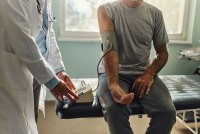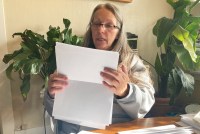Latest KFF Health News Stories
States Expand Health Coverage for Immigrants as GOP Hits Biden Over Border Crossings
More than 1 million immigrants, most lacking permanent legal status, are covered by state health programs. Several states, including GOP-led Utah, will soon add or expand such coverage.
La mayoría de los adultos sin papeles trabajan, representan aproximadamente el 5% de la fuerza laboral nacional, según el Pew Research Center.
Bold Changes Are in Store for Medi-Cal in 2024, but Will Patients Benefit?
California’s Medicaid program is undergoing major changes that could improve health care for residents with low incomes. But they are happening at the same time as several other initiatives that could compete for staff attention and confuse enrollees.
Se avecinan cambios para Medi-Cal en 2024, pero ¿beneficiarán a los pacientes?
A partir del próximo año, más de 700,000 inmigrantes sin papeles serán elegibles para una cobertura completa de Medi-Cal.
What the Health? From KFF Health News: 2023 Is a Wrap
2023 was another busy year in health care. As the covid-19 pandemic waned, policymakers looked anew at long-standing obstacles to obtaining and paying for care in the nation’s health care system. Meanwhile, abortion has continued to be an issue in much of the nation, as states respond to the Supreme Court’s 2022 decision overturning the constitutional right to the procedure. This week, Rachel Cohrs of Stat, Sandhya Raman of CQ Roll Call, and Joanne Kenen of Johns Hopkins University and Politico Magazine join KFF Health News chief Washington correspondent Julie Rovner to discuss these issues and wrap up the year in health. Also this week, Rovner interviews KFF Health News’ Jordan Rau about his joint KFF Health News-New York Times series “Dying Broke.”
New Doula Benefit ‘Life-Changing’ for California Mom
Doulas, independent workers who act as advocates for birthing parents, have been shown to help prevent pregnancy complications and improve the health of both mothers and babies. California’s Medicaid program started covering their services this year, but some doulas say bureaucratic obstacles and inadequate pay prevent their effective use.
In New Year, All Immigrants in California May Qualify for Medicaid Regardless of Legal Status
In the new year, California’s Medicaid program will open to otherwise eligible immigrants ages 26 to 49 without legal residency. They will join children, young adults, and adults over 50 enrolled in Medi-Cal through previous expansions to residents lacking authorization. The change is expected to add over 700,000 first-time enrollees.
Los nuevos inscritos se sumarán a más de 655,000 niños, adultos jóvenes de hasta 25 años y adultos de 50 años y más que ya se han registrado en Medi-Cal a través de expansiones anteriores para residentes sin papeles.
Gun Violence Is a Plague. Could Medicaid Help?
To tackle America’s gun problem, a growing number of states are allowing Medicaid dollars to fund community-based violence programs intended to stop shootings. The idea is to boost resources for violence prevention programs, which have been overwhelmed in some cities by a spike in violent crime since the covid-19 pandemic. An infusion of reliable funding, […]
Journalists Delve Into Gun Violence, Medicaid’s ‘Unwinding,’ Opioid Lawsuits, and More
KFF Health News and California Healthline staffers made the rounds on national and local media this week to discuss their stories. Here’s a collection of their appearances.
What the Health? From KFF Health News: Democrats See Opportunity in GOP Threats to Repeal Health Law
Sensing that Republicans are walking into a political minefield by threatening once again to repeal the Affordable Care Act, the Biden administration is looking to capitalize by rolling out a series of initiatives aimed at high drug prices and other consequences of “corporate greed in health care.” Meanwhile, the Supreme Court hears a case that could determine when and how much victims of the opioid crisis can collect from Purdue Pharma, the drug company that lied about how addictive its drug, OxyContin, really was. Alice Miranda Ollstein of Politico, Anna Edney of Bloomberg News, and Rachana Pradhan of KFF Health News join KFF Health News chief Washington correspondent Julie Rovner to discuss these issues and more. Also this week, Rovner interviews Dan Weissmann of KFF Health News’ sister podcast, “An Arm and a Leg,” about his investigation into hospitals suing their patients over unpaid bills.
California’s Ambitious Medicaid Experiment Gets Tripped Up in Implementation
The health care insurers, nonprofit organizations, and other groups responsible for implementing Gov. Gavin Newsom’s ambitious plan to infuse Medicaid with social services say their ability to serve vulnerable, low-income Californians is hamstrung.
What the Health? From KFF Health News: Trump Puts Obamacare Repeal Back on Agenda
Although Republicans have never united behind a replacement for the Affordable Care Act, 2024 GOP presidential front-runner Donald Trump said this week he wants to put the issue back on the national agenda. That delights Democrats, who have won at least two elections partly by defending the now-popular health law. Meanwhile, the Texas Supreme Court takes up a case brought by women who say their pregnancy complications further endangered their health due to the vagueness of Texas’ near-total ban on abortions. Joanne Kenen of Johns Hopkins University and Politico Magazine, Sarah Karlin-Smith of the Pink Sheet, and Victoria Knight of Axios News join KFF Health News chief Washington correspondent Julie Rovner to discuss these issues and more. Also this week, Rovner interviews KFF Health News’ Rachana Pradhan, who reported and wrote the latest “Bill of the Month” feature.
Adultos mayores, detectives contra avisos engañosos de Medicare Advantage
Funcionarios de los Centros de Servicios de Medicare y Medicaid le han pedido a las personas mayores y a otros miembros de la comunidad que sean detectives contra el fraude, denunciando tácticas de venta engañosas al 800-MEDICARE.
Uncle Sam Wants You … to Help Stop Insurers’ Bogus Medicare Advantage Sales Tactics
The Biden administration wants to crack down on deceptive or misleading Medicare Advantage and drug plan sales tactics. It’s counting on beneficiaries to help catch offenders.
El daño colateral de la crisis de Medicaid: miles están perdiendo beneficios de alimentos
Las familias de bajos ingresos que necesitan servicios como ayuda alimentaria y dinero en efectivo, se ven afectadas por la carrera burocrática para determinar si decenas de millones de personas aún califican para Medicaid.
Medicaid ‘Unwinding’ Makes Other Public Assistance Harder to Get
The bottleneck caused by states’ reevaluation of Medicaid enrollees has swept up low-income families that rely on other safety-net services.
Medicaid’s ‘Unwinding’ Can Be Especially Perilous for Disabled People
Earlier this year, Beverly Likens thought she’d done everything she needed to do to keep her Medicaid. Then came an unwelcome surprise: Ahead of surgery to treat chronic bleeding, the hospital said her insurance was inactive, jeopardizing her procedure. Likens had just been diagnosed with severe anemia and given a blood transfusion at the emergency room. “I […]
What Would a DeSantis Presidency Look Like for Health Care?
Ron DeSantis’ record as Florida governor provides some clues to how he would change the health care landscape if elected president. In his five years as governor, DeSantis has promoted stricter abortion rules and emphasized individual freedom over the benefits of public health.
1 in 3 People Dropped by Utah Medicaid Left Uninsured, a ‘Concerning’ Sign for Nation
About a third of the 130,000 people Utah has dropped from Medicaid this year say they now lack health insurance. It’s a glimpse into the fate of people caught up in Medicaid’s “unwinding.”


















